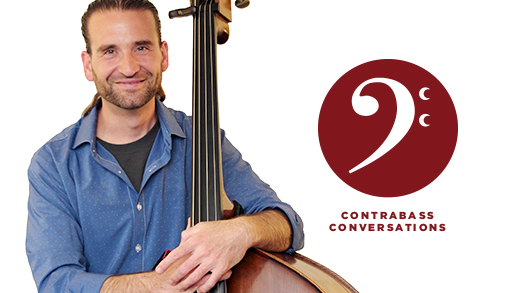Today’s episode features Ithaca College professor and International Society of Bassists 2017 Convention Chair and Artistic Director Nicholas Walker. In addition to teaching at Ithaca College, Nicholas performs over 170 concerts a year in a wide variety of musical genres, he is a prolific composer, and he has taught for many years along with Paul Ellison and François Rabbath at Domaine Forget in Quebec. Nicholas will be hosting the 2017 ISB Convention at Ithaca College next June 5-10.
We talk about his early musical influences, his experiences working with Paul Ellison and François Rabbath, balancing performing with other activities, and the Ithaca double bass experience. We also go into great detail about a day in the life of a student at Domain Forget, which is a topic that we talked about with David Allen Moore back on episode 162 of the podcast.
We also feature several musical excerpts from Nicholas, starting with excerpt of a tune with singer songwriter Tenzin Chopak called “Just Don’t Go.” We’ll also play a few excerpts of some of Nicholas’ solo bass compositions, and you can find complete recordings on his YouTube channel. Enjoy!
Musical Excerpts:
- “Just Don’t Go” with singer songwriter Tenzin Chopak
- Chorale – solo bass
- Watermark – with cellist Elizabeth Simkin
Interview Highlights
Background and Early Years
- started on piano, picked up bass in 4th grade, playing jazz early on and music with friends in addition to the public school
- started taking lessons with Duane Rosengard, who was a student at Eastman at the time
- played in the Rochester Philharmonic Youth Orchestra
- studying with Mark Foley
- with many of the people surrounding Nicholas, there wasn’t a big distinction between jazz and classical playing – it was all part of musical life for him
Working with Paul Ellison
- moving to Houston and meeting Paul Ellison
- Paul’s teaching style
- the Domaine Forget double bass experience
- Buddhist philosophy – any student who shows up has earned the right to learn
- Paul’s comfort moving from student to teacher role
Working with François Rabbath
- the right time to hear something from a teacher
- how, exactly, can he help each particular person
- his first experience meeting François
A Day in the Life at Domaine Forget
- put the bass players in a barn and let them work
- get up early
- 8:30 am – all meet together – 25 students plus the two teachers
- bodywork and 90 minute workout together
- Stretching
- Yoga
- Feldenkrais Method
- Alexander Technique
- Pilates
- bass workout together – all done by ear and by rote – no music stands – working together in a big circle
- shifting exercises
- bowing exercises
- specific left hand techniques
- hand frames
- drop thumb
- expansion
- pivoting
- hammer on / pull off
- fingering patterns
- etudes
- at the end of the two weeks, they have a 90 minute routine that they do together without stopping – one exercise after another
- all this material comes from meeting with all the students the first night and asking them their goals for the camp
- 10 am – break followed by two hours of lessons
- lunch
- 1:30 pm – back in the barn for another 90 minute class with the senior faculty member
- Paul does a lot of stroke work and body awareness
- opportunity to introduce concepts like balance, arm weight, anything that came up in prior master classes
- everything from the simplest open string playing to more complex bow bouncing, forward/reverse curve
- 3:00 pm – master class
- evening – concerts with notable visiting artists, bass recital, public master classes
The Double Bass Program at Ithaca
- largely modeled on the way Domaine Forget operates
- one of the nation’s oldest conservatories – Sevcik and Rachmaninoff were both on faculty
- group classes for technique, orchestra rep, studio class in addition to lessons
- alternative lesson approaches in addition to traditional one-on-one lessons
Performing, Teaching, and Composing
- finding balance (or not finding balance)
- being at peace with the choices you make
- 170-180 concerts a year
- the concerts and individual practice are where the “important stuff” happens

